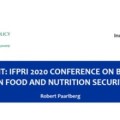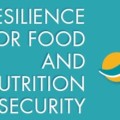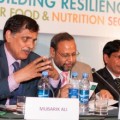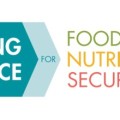Prior to the 2020 conference, IFPRI commissioned an independent impact assessment report in order to determine the impact of the Conference on individual participants, professional discourse, organizational participants, and IFPRI itself.
New Food Policy Report: Networks for Resilience
In their new IFPRI 2020 Food Policy Report on “Networks for Resilience: The Role of Social Capital,” Quinn Bernier and Ruth Meinzen-Dick investigate the role that local forms of social capital play in enhancing resilience through risk-smoothing and risk-sharing practices.
2020 Conference book released: Resilience for Food and Nutrition Security
Resilience for Food and Nutrition Security, the newly released 2020 Conference book, edited by Shenggen Fan, Rajul Pandya-Lorch, and Sivan Yosef, assesses shocks, reviews approaches and tools, and identifies what works to build resilience.
Food Policy Report Examines Role of Food Security in Building Resilience to Conflict
A new IFPRI 2020 food policy report on “How to Build Resilience to Conflict: The Role of Food Security” is now available.
New IFPRI Food Policy Report on Resilience Programming Among NGOs
IFPRI has released a new food policy report on “Resilience Programming Among Nongovernmental Organizations: Lessons for Policymakers.” The report, authored by Tim Frankenberger, Mark Constas, Suzanne Nelson, and Laurie Starr, makes the case that building resilience depends on integrated programming that crosses sectors and a long-term commitment to improving different types of capacity.
Rapporteur Notes Now Available from Parallel Sessions
Session notes from rapporteurs are now available for 2020 Conference parallel sessions on May 16 and 17. Explore these notes to read more about the key points and discussions from each session.
Highlights from Conference Brief 11: Gender, Shocks, and Resilience
Households in developing countries rely on a variety of strategies to cope with shocks. While the importance of social safety nets in protecting impoverished households is widely accepted, the role of gender, in underlying vulnerabilities and response to shocks, remains largely ignored. In their 2020 Conference Brief Gender, Shocks, and Resilience, IFPRI’s Neha Kumar and >> Read more
Day Three in Photos
Highlights from Conference Brief 2: Enhancing resilience for food security in refugee-hosting communities
In 2012, the world was home to about 28 million people who had fled their home region or country, and most of these people were hosted in developing countries. These refugees and internally displaced people (IDPs) have tended to be the focus of publicity and relief efforts—but what happens to the resilience and food security >> Read more

















